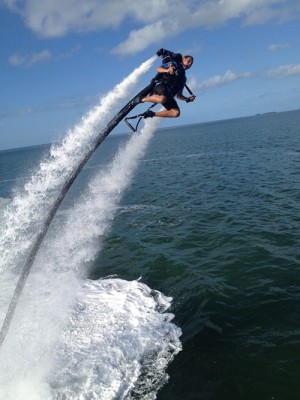
OCEAN CITY — The Maryland Department of Natural Resources (DNR) has submitted a formal request to the Maryland Administrative Executive and Legislative Review to establish emergency regulations to cover jetpacks, a fairly new category of recreational vessel that has sprouted up in and around the resort area.
Often worn on the operator’s back, the devices use water jets to lift a rider as much as 30 feet above the water. While the operators provide extensive training to the renters before they ever hit the water, the thrill rides can pose a danger to both riders and bystanders. In certain instances, they can also cause environmental and property damage, and pose a disruption to other boaters. Thus far, Florida, Texas, Arizona, Hawaii and some west coast states have enacted laws regulating jetpack use and Maryland could soon follow suit.
Currently in Maryland, there are three businesses, all located in Ocean City, which rent a different version of jetpacks. The operators all agree jetpacks should be regulated and have the past year working with DNR to develop emergency regulations. DNR Boating Advisory Committee liaison Mike Grant said this week emergency regulations are being explored for the benefit of all stakeholders.
“They are fairly new in Maryland, but they are very popular in other states like Florida, Texas, California and even the Caribbean,” he said. “Like anything else out on the water, we want to explore getting some regulations on the books to make sure they are safe for the operators, safe for the environment and also protect the businesses that are renting them.”
While increased regulations can often be adversarial, the same cannot be said of the effort to get some regulations on jetpacks on the books. Grant said the three businesses in Ocean City currently renting the recreational vessels have been at the forefront to regulate them somewhat.
“There are three operating in Ocean City and all of them have been very receptive to the idea of getting some regulations on these,” he said. “They want this as much as we do. They even did a presentation for our advisory board at Sandy Point and demonstrated their uses and their safety procedures and training procedures.”
Grant said the DNR and its law enforcement arm, the Natural Resources Police (NRP), is working with allied agencies to explore possible regulations. The town has also expressed an interest in getting something on the books to regulate the jetpacks.
“The Coast Guard and the Natural Resources Police just want to get a better understanding of what these things do and what some of the dangers or concerns might be,” he said. “Ocean City is behind this too. They’ve expressed an interest in getting some regulations on these things.”
The business owners themselves have a vested interest in getting regulations on the books for jetpacks. The equipment is expensive and the operators have spent a lot of time and energy on getting their instructors certified and completing training. The overriding concern is that other less safety-conscious operators could set up shop and compete with the existing businesses that are handling them the right way.
“The operators are interested in new regulations because they are concerned about their business,” he said. “These jetpacks are very expensive, and the companies that have their people certified and qualified to train the renters don’t want to see someone else come in that doesn’t have the certification or the training. They just want to be sure they have the bases covered, just like we do.”
During the 180-day emergency regulation period, set to begin this month, DNR’s Boating Services and Natural Resources Police will examine how the temporary rules affect the general public and boating operations. Depending on the results, DNR may hold a public hearing next January to possibly enact permanent regulations in time for the 2015 season.
